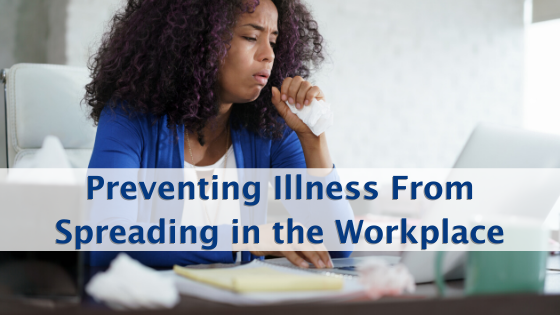
People getting sick in your workplace can seriously affect productivity. Even worse is when sick employees show up for work and are so unfocused they make mistakes that negatively affect productivity instead of just slowing it down. Creating a safe environment and having policies in place to keep it safe can be a great way to combat sickness in the workplace.
Creating a safe environment
Hiring a biohazard cleanup team can ensure removal of any past incidents of biohazards such as vomit, blood, or fecal matter and ensure the environment is clean. They will use industrial cleaners to clean the mess and can use tools to clean the bacteria in the air and then remove it from the room.
Not sharing tools or equipment
Sharing equipment such as staplers, headsets, pens, etc. can help spread germs. A lot of illnesses are contagious before they show symptoms so it won’t be obvious that an employee is sick and using or borrowing something from their desk can spread germs. Try having enough equipment so there isn’t a need to share tools and if there are equipment that has to be shared such as printers then having some electronic safe disinfectant wipes around the equipment can cut down on germs.
Hand Sanitizer
Having a few of these around shared rooms such as conference rooms, bathrooms, kitchens, etc can help promote use and cut down on the chances of germs on surfaces.
Hand Washing Signs
Keeping these around the bathrooms and kitchen sinks to encourage healthy habits and remind those that touching surfaces and then their face or mouth is a very common reason why people get sick. Employees should also be told that simply using water, a quick drop of soap, and quick rinse isn’t enough to kill germs on your hands. Hand washing should be more thorough to be effective.
Touching Your Face
Your face has a few openings that can lead bacteria and get you sick especially respiratory illnesses from bacteria getting to your lungs. Cleaning the surfaces and frequently washing your hands can go a long way but to further the efforts you should try to refrain from touching your face. Some bacteria can even enter via the eyes and as such the habit of rubbing your eyes should be broken. Another habit to break is to sneeze or cough on your hands, which leads to touching your face and surfaces spreading germs. Try to use a tissue when you can and cough into your arm.
Old Food and Drink Containers
Old food containers can spread germs and mold spores and should be thrown out or cleaned out. It’s very common to have old mugs of coffee in the office and they should be cleaned regularly. It would be a good idea to have a clean container policy and have dish detergent available in the kitchen sink or common area sink.
Stop Bad Habits
Stop bad habits that can spread germs such as the bad habit that some will lick their fingers before flipping between pages or money in the case of cashiers. Sneezing and coughing into the hands are another bad habit to break as it can help spread germs on surfaces. You should try to cough into your arm’s sleeve. Another bad habit is touching your face or rubbing your eyes. Touching a surface with germs and then your face can risk getting bacteria into your body and in the case of a respiratory illness get into your lungs.
Flu shots and other vaccines
Promoting flu shots and where employees can get them at low or no cost can help cut down on the chances the flu will spread among the workplace. Try to find out which pharmacies near the workplace are giving out flu shots and if they accept the company's insurance.
Open drink containers
A sneezing employee is spreading germs in the air and with open drink containers such as cups or mugs can result in sick employees. A policy where drinks must be in covered containers such as tumblers and travel cups can help cut down on this and also cut down on the number of spills on office equipment such as laptops and keyboards.
Keep sick employees home
Even this seems like this could hurt productivity, it’s usually more beneficial to keep sick employees from coming in. A sick employee is not as productive as they are when they are healthy and sometimes are so unfocused they can cause big mistakes. Losing 1 less productive sick employee for a week is probably going to be better than having 4-5 sick employees working less efficiently. Encourage employees to use sick time and stay home rather than come in and upon being notified an employee is out due to illness, have someone use disinfectants around their work area or office as they were probably contagious a few days before calling out and there still may be germs on the surfaces.
